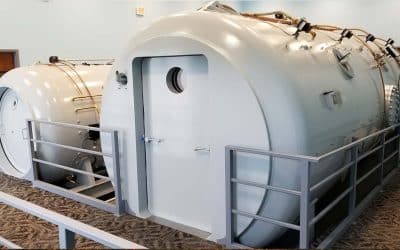The present review evaluated the effect of hyperbaric oxygenation (HBO) therapy on post-concussion syndrome (PCS). Searches for publications from the earliest date possible up until the first week of 2016 were conducted using the electronic databases Cochrane, EBSCOhost, Embase, Ovid MEDLINE, PubMed and Web of Science. Additional trials were identified through reference list scanning. Randomized controlled trials assessing the effectiveness of HBO therapy in PCS were selected and tested for eligibility for inclusion in the present review.
Concussion
Hyperbaric Oxygen Therapy (HBOT) Research for concussion.
Effect of hyperbaric oxygen therapy on chronic neurocognitive deficits of post-traumatic brain injury patients: retrospective analysis.
The aim of the study is to evaluate the effect of hyperbaric oxygen therapy (HBOT) in participants suffering from chronic neurological deficits due to traumatic brain injury (TBI) of all severities in the largest cohort evaluated so far with objective cognitive function tests and metabolic brain imaging. A retrospective analysis was conducted of 154 patients suffering from chronic neurocognitive damage due to TBI, who had undergone computerised cognitive evaluations pre-HBOT and post-HBOT treatment. The average age was 42.7-14.6 years, and 58.4% were men. All patients had documented TBI 0.3-33 years (mean 4.6-5.8, median 2.75 years) prior to HBOT. HBOT was associated with significant improvement in all of the cognitive domains, with a mean change in global cognitive scores of 4.6-8.5 (p<0.00001).
Evidence brief: hyperbaric oxygen therapy (HBOT) for traumatic brain injury and/or post-traumatic stress disorder.
This report is a product of the VA Evidence-based Synthesis Program. The purpose is to provide “timely and accurate syntheses of targeted healthcare topics. to improve the health and healthcare of Veterans”. The authors have made a comprehensive search and analysis of the literature and make recommendations to assist clinicians in dealing with veterans suffering from either traumatic brain injury (TBI) or post-traumatic stress disorder (PTSD). The report is timely and of great potential impact given the vigorous and lengthy debate among hyperbaric physicians and lay people determined to find an answer for the large numbers of veterans deeply affected with some combination of PTSD and post-concussion dysfunction.
HYPERBARIC OXYGEN THERAPY- BASICS AND NEW APPLICATIONS
Hyperbaric oxygen therapy (HBOT) serves as primary or adjunctive therapy for a diverse range of medical conditions. The indication for HBOT can be related to either pressure (decompression sickness or air emboli) or tissue hypoxia. It is now realized, that the combined action of hyperoxia and hyperbaric pressure, leads to significant improvement in tissue oxygenation while targeting both oxygen and pressure sensitive genes, resulting in improved mitochondrial metabolism with anti-apoptotic and anti-inflammatory effects. Clinical studies published in recent year’s present convincing evidence that HBOT can be the coveted neurotherapeutic method for brain repair. Here we discuss the multi-faceted role of HBOT in wound care in general and in neurotherapeutics in detail.
Hyperbaric oxygen for post-concussive symptoms in United States military service members: a randomized clinical trial
Abstract Background: In prior military randomized trials, participants with persistent symptoms after mild traumatic brain injury (TBI) reported improvement regardless of receiving hyperbaric oxygen (HBO₂) or sham intervention. This study's objectives were to identify...
The protection effect and mechanism of hyperbaric oxygen therapy in rat brain with traumatic injury.
To investigate the effect of hyperbaric oxygen therapy (HBOT) on traumatic brain injury (TBI) outcome. The modified Marmarou’s weight drop device was used to generate non-lethal moderate TBI rat model, and further developed in vitro astrocytes culturing system. Then, we analyzed the expression changes of interested genes and protein by quantitative PCR and western blot. Multiple HBO treatments significantly reduced the expression of apoptosis promoting genes, such as c-fos, c-jun, Bax and weakened the activation of Caspase-3 in model rats. On the contrary, HBOT alleviated the decrease of anti-apoptosis gene Bcl-2 and promoted the expression of neurotrophic factors (NTFs), such as NGF, BDNF, GDNF and NT-3 in vivo. As a consequent, the neuropathogenesis was remarkably relied with HBOT.
Case control study: hyperbaric oxygen treatment of mild traumatic brain injury persistent post-concussion syndrome and post-traumatic stress disorder.
Mild traumatic brain injury (TBI) persistent post-concussion syndrome (PPCS) and post-traumatic stress disorder (PTSD) are epidemic in United States Iraq and Afghanistan War veterans. Treatment of the combined diagnoses is limited. The aim of this study is to assess safety, feasibility, and effectiveness of hyperbaric oxygen treatments (HBOT) for mild TBI PPCS and PTSD. Thirty military subjects aged 18-65 with PPCS with or without PTSD and from one or more blast-induced mild-moderate traumatic brain injuries that were a minimum of 1 year old and occurred after 9/11/2001 were studied. The measures included symptom lists, physical exam, neuropsychological and psychological testing on 29 subjects (1 dropout) and SPECT brain imaging pre and post HBOT.
Increased circulating stem cells and better cognitive performance in traumatic brain injury subjects following hyperbaric oxygen therapy.
Traumatic brain injury (TBI) may cause persistent cognitive dysfunction. A pilot clinical study was performed to determine if hyperbaric oxygen (HBO₂) treatment improves cognitive performance. It was hypothesized that stem cells, mobilized by HBO₂ treatment, are recruited to repair damaged neuronal tissue. This hypothesis was tested by measuring the relative abundance of stem cells in peripheral blood and cognitive performance during this clinical trial. The subject population consisted of 28 subjects with persistent cognitive impairment caused by mild to moderate TBI suffered during military deployment to Iraq or Afghanistan. Fluorescence-activated cell sorting (FACS) analysis was performed for stem cell markers in peripheral blood and correlated with variables resulting from standard tests of cognitive performance and post-traumatic stress disorder: ImPACT, BrainCheckers and PCL-M test results. HBO₂ treatment correlated with stem cell mobilization as well as increased cognitive performance. Together these results support the hypothesis that stem cell mobilization may be required for cognitive improvement in this population.
Review of recent non-hyperbaric oxygen interventions for mild traumatic brain injury.
Traumatic brain injury (TBI) affects 3.2 to 5.3 million persons in the United States (U.S.), and the impact in the U.S. military is proportionally higher. Consensus is lacking regarding an accepted outcome to measure the effectiveness of interventions to improve the symptoms associated with TBI, and no standard-of-care treatment exists for mild TBI (mTBI). A recent literature review evaluated hyperbaric oxygen therapy (HBO₂) interventions, and findings were mixed. We conducted a systematic review of non-HBO₂ mTBI interventional trials published in 2005-2015 in military and civilian populations. A total of 154 abstracts, seven randomized controlled trials (RCTs) and five pilot studies were reviewed. RCTs were evaluated using Consolidated Standards of Reporting Trials criteria. Results indicated that studies published within the period of review were small pilot studies for rehabilitation therapy and motion capture or virtual reality gaming interventions. Neuropsychological assessments were commonly specified outcomes, and most studies included a combination of symptom and neuropsychological assessments. Findings indicated a lack of large-scale, well-controlled trials to address the symptoms and sequelae of this condition, but results of small exploratory studies show evidence of potentially promising interventions.



